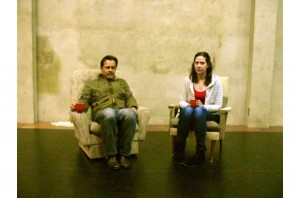Mongrel | Sydney Fringe & The Spinster and The Whippet
- September 25th, 2011
- Posted in Reviews & Responses
- Write comment

David and Saskia sit in a lounge room hemmed with VHS tapes of Disney classics and still in their plastic-wrap board games. It isn’t long before David (Terry Serio) quizzes Saskia (Jenna Martin) on the finer details of her job – extracting money from people for “Earthaid.” She saving up, she has plans to “go somewhere”, but there’s something not quite right here.
Carolyn Burns has clearly been encouraged by the success of her debut play “Careers for Attractive Ladies” which (according to the program notes) during the 2010 Sydney Fringe Festival was well received at The Petersham Town Hall. Since then she has been writing a PhD and participating in ATYP’s Fresh Ink Program and writing Mongrel.
The play is a very simple two-hander with a very simple premise – What happens when a young, female charity representative is held hostage in a strange man’s house? And there is absolutely NOTHING wrong with simple.
But the question goes a little deeper – the question is not what brings people together, but what keeps them together? What stops either person from walking away. If they are trapped, how will they attempt to escape? A simple question and a simple investigation by Burns who traverses more of the political and social concerns of society, gender and generational relationships than one could guess in this 40 minute offering.
Though I must admit that I disagree with Alana Hicks, the director, whose program notes claim that “Mongrel is a meditation on social isolation, on life passing you by.” I disagree. I don’t think it is a meditation. I think it’s a wrestle – an all out tug of war – between the characters and within the characters. A wrestle with expectation, regret, exploitation, acceptance and yearning. And despite it’s structural simplicity, this play has many intricacies and complexities.
At times the push-forward push-through acting style of the actors is very forceful, highlighting the awkward conversation. And indeed conversations between strangers are often a lot more forced and therefore awkward than the comfortable conversations between friends or lovers. It is appropriate then that the straightforward, straight shooting “tell me what you want” agendas are put straight out on the table. What is interesting however is the shift in David – and it is truly his story.
Terry Serio is a magnificent actor. Most people have seen him on stage in something at some stage – and he is always fascinating and easy to watch. I have been a fan (and friend) for sometime but this is the first time I have seen him in something like this. Serio adds a grace and a coarse vulnerability to David. He’s scary, pathetic, lovable all at once – and that’s not an easy trio to achieve or wrangle. It is the final moments of the play which are throat-chokingly real and make the preceding 30 minutes make sense – we watch the captor break. We watch as David is broken by a hug. Sincerely broken – and it is one of the most profound moments I have experienced this Fringe Festival.
Unfortunately Saskia’s transformation and journey is not so elegantly marked. A combination of an emerging actor, urgently sticking to the surface of the text and a slightly smaller arc means that the true depth of Saskia, her fear, her fragility, her arrogance is never fully realised. But there is great potential in Martin, if she can relax and let the unsaid rise to the surface a little more.
Though I very much appreciated the freedom and scope she granted her performers, I felt nearly no connection between this text and the plays named by Hicks. Beckett’s Waiting for Godot and Strinberg’s Dance of Death. Instead I felt a strong resonance with Buzo’s Norm and Ahmed. Yes – they are waiting but it is something that is within the control of those in the room. These characters are wholly in control of their own destiny and they feel the pressure of it. Ultimately, for me, there are large social issues being explored and presented in this play – and that is exciting. We are confronted with the moral dilemma of how we impact and influence each other -personally.
I leave the theatre asking myself – if I could (or perhaps I already have) hug/connect/love someone for whom that hug/connection/love was so destructive it broke them, would I insist on it anyway? What happens when we force ourselves on each other? What are we left with? What do we leave behind? Who do we leave behind? When does kindness destroy and when does harm help people grow?
Not a bad string of questions to be ruminating.
Looking forward to seeing more work from this company, and especially Carolyn Burns.